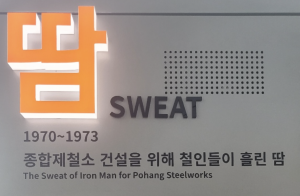Pohang: POSCO Museum
Photo essay of wall text of POSCO Museum of Pohang

Photo essay of wall text of POSCO Museum of Pohang

XXX

Many other research papers, articles, books, and sources of research were referencd in the article. The author read and studied a lot of research in various areas and covering all of the topics discussed in this paper, then strengthened ideas and concepts with enough support from hard research to write this article.
I was most interested by how hard the doctors worked beyond the medical stuff to care for the patients. Whether it is making sure they have somewhere warm to be discharged to or keeping them long enough that they can get the medicaltions they need, they really do more than medicine.
Paul E Farmer, Bruce Nizeye, Sara Stulac, Salmaan Keshavjee are listed as the authors of this paper. They work with the health workers in suffering countries, like Haiti. Farmer is a co-founder of Partners in Health, as well as a physician and anthropologist. Stulac is an MD, MPH, specializing in pediatrics, and is also associated with PIH. Keshavjee is an MD, PhD, professor at Harvard of Global Health and Social Medicine. They are all professionals in the field of medicine, and through the PIH, they are well acquainted with responding to global health issues.
" At just the moment when it seemed that infectious disease was about to be conquered, and that the critical health problems of the industrialized world now involved chronic disease and diseases of lifestyle, experts warned, we were witnessing a “return of the microbe.”"
" The aim of such techniques is not to manage known disease but to address vulnerabilities in health infrastructure by, for example, strengthening hospital surge capacity, stockpiling drugs, exercising response protocols, and vaccinating first responders. Approaches based on preparedness may not be guided by rigorous cost-benefit analysis. Rather, they are aimed at developing the capability to respond to various types of potentially catastrophic biological events."
"Security — the freedom from fear or risk — always suggests an absolute demand; security has, as Foucault wrote, no principle of limitation. There is no such thing as being “too secure.”51 Living with risk, by contrast, acknowledges a more complex calculus. It requires new forms of political and ethical reasoning that take into account questions that are often only implicit in discussions of biosecurity interventions."
The first hand interviews from first responders are compiled in a way that goes through the stories of what heppened, how health information was released and changed. The first repsonder stories are intermixed with testimonies from the EPA workers, showing differences in the science that was found and the press releases disclosing the health concerns. Many tear up upon realizing how their health will hurt their families. The doctors in the area caught onto the trends in poor health and started a monitoring program to make sure everyone got the medical screening and help they needed. The lives of all of the first responders and their families were changed drastically from their public service.
NYC Dept of Correction,
Legal Aid Society,
Susi Vassallo - monitored temperatures on Rikers Island,
Rikers,
Hailey-Means, Freddie McGrier (both inmates)